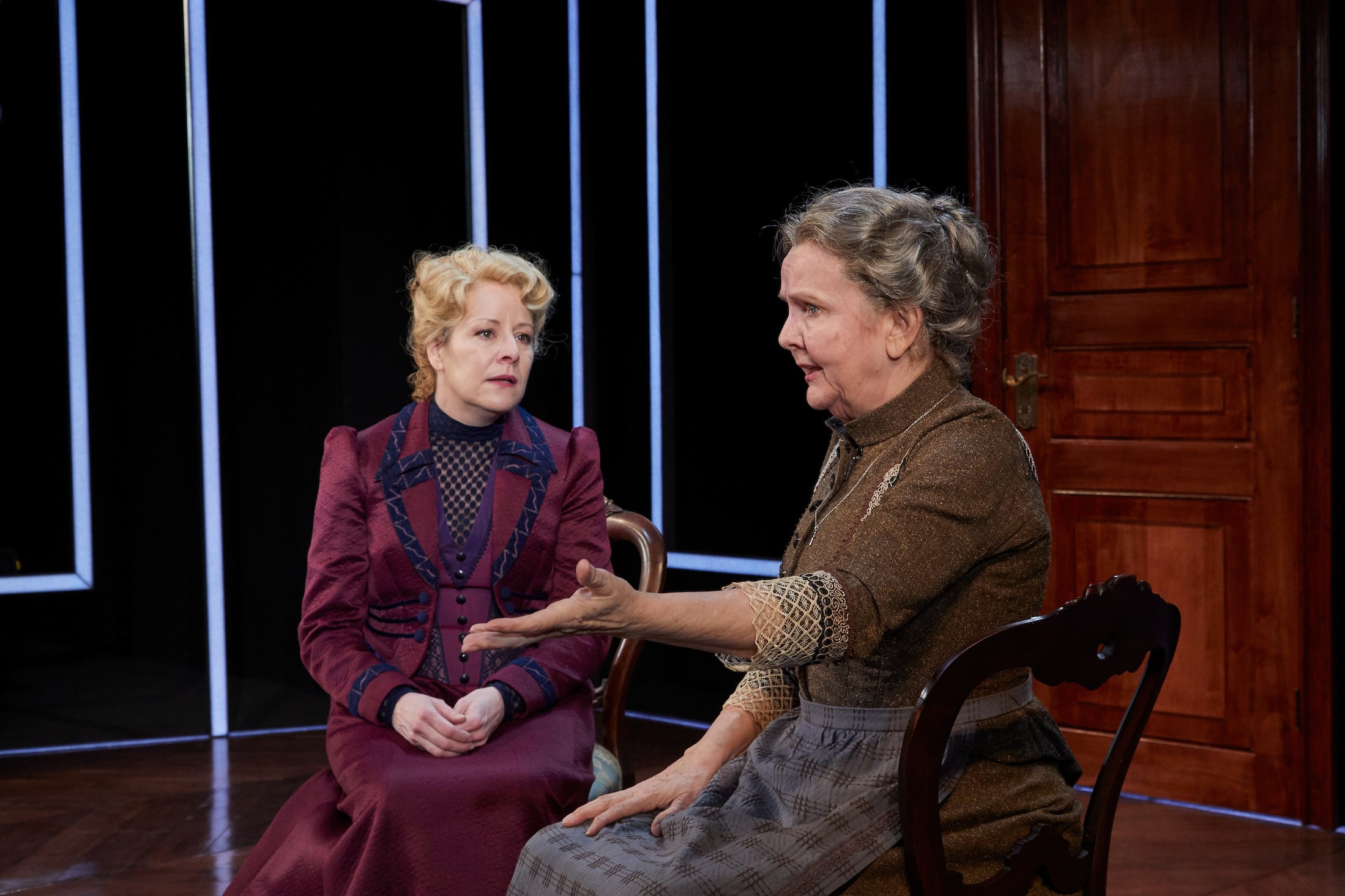Review of The Lifespan of a Fact, TheaterWorks, Hartford
TheaterWorks is back with another play seemingly ripped from the headlines, though these days, in terms of their lifespan, facts could said to be on life support, or even in hospice care.
The story behind the play (what seem the agreed-upon facts): author John D’Agata, an essayist who has issues with the practices of journalism and the concept of nonfiction, wrote an essay inspired by the death of Levi Presley, a teen who jumped from the tower of the Stratosphere Hotel in Las Vegas in 2002. D’Agata’s essay was about Vegas, suicide, and other issues he deemed relevant. Harper’s passed on the essay; The Believer took it on and assigned Jim Fingal to fact-check it. Fingal found numerous inaccuracies and questioned, rigorously, much of D’Agata’s authorial license. In 2010, The Believer published the essay, titled “What Happens There.” In 2012, The Lifespan of a Fact was published, a book that revealed the years of dickering over the essay that went on between D’Agata and Fingal, edited by Jill Bialosky. In 2018, a play by Jeremy Kareken & David Murrell and Gordon Farrell based on the book opened on Broadway with an all-star cast of Daniel Radcliffe, Bobby Cannavale, and Cherry Jones.
John D’Agata (Rufus Collins), Emily Penrose (Tasha Lawrence), Jim Fingal (Nick LaMedica) in The Lifespan of a Fact at TheaterWorks (photo by Lanny Nagler)
The Lifespan of a Fact plays at TheaterWorks through March 8, directed by Tracy Brigden and starring Nick LaMedica as Jim Fingal, Rufus Collins as John D’Agata, and Tasha Lawrence as fictional editor Emily Penrose. The play adds drama by making Fingal a new recruit at a publication where D’Agata’s essay is accepted who wants desperately to please his boss—and he has only a weekend to complete the job of checking D’Agata’s facts. He contacts D’Agata, first by email then by phone and, in a nice theatrical touch, is revealed sleeping on D’Agata’s couch, having gone to Vegas—where D’Agata lives in his recently deceased mother’s home—to check on some facts such as the color of the tower’s bricks and the number of lanes involved in what D’Agata calls a traffic jam at its base. Eventually, against any kind of expectation of how editors work, Penrose shows up too. And the showdown begins: to publish or not to publish, since D’Agata seemingly won’t accept any changes. However farfetched her presence is, Lawrence’s bristly impatience, familiarity with D’Agata’s ways, and archly maternal attitudes are welcome.
Nick LaMedica, a very capable comic actor, keeps the proceedings amusing. The play focuses on his truculent insistence on holding D’Agata to account. It’s not so much a pursuit of truth as an effort to protect the world from the kind of bullshit that passes for poetic license or rhetorical sleight-of-hand and which flows blithely through much reporting, most advertising copy, and many-too-many political speeches and presidential tweets. It’s hard not to be on Fingal’s side even if he is a somewhat manic nerd. And even if D’Agata were less of the pompous ass Collins plays him as. There’s physical humor, double-takes, joking asides, and a rather sitcom sense of character and situation.
Jim Fingal (Nick LaMedica) in The Lifespan of a Fact at TheaterWorks (photo by Lanny Nagler)
Certainly, there’s enough here to wax editorial about. As a book, Lifespan might be an interesting exhibit of how two different minds interpret events and the task of turning events into writing. As a play, the treatment gives more importance and impact to D’Agata’s stunts than they outwardly merit. Some examples—such as D’Agata’s claim that a caller who hung up on him when he worked a Vegas suicide crisis line was Presley—aren’t so much factual deviations as suppositions. Something an editor should decide on the value of, for the essay, and either strike or alter or let stand. D’Agata’s sense of truth assumes that emotions are facts. What he feels he is free to write as his view of the facts. And yet the notion that his inaccuracies might cause emotional distress in others doesn’t faze him in the least. Collins makes us register that there is some issue at work in D’Agata, but the play never comes close to deciding what it might be, other than the loss of his mother.
In any case, what’s at stake isn’t so very much, ultimately. Given the kind of publication D’Agata’s piece would appear in, a writerly persona giving a “take” on the events is more or less assumed. In his own mind D’Agata may be the like of Norman Mailer, a titan of prose able to bend the facts of the world to his literary authority, or maybe a “gonzo journalist” like Hunter S. Thompson who once claimed the only source of objective reporting was a ticker-tape machine. Mostly, one assumes, that any readers who stick with D’Agata’s account from beginning to end do so because they simply love what he “does.” His writing is the kind that treats the world as if in need of an author’s intervention to make any sense at all.
In its delivery, Lifespan is one of those plays where topicality trumps any effort to make things interesting or surprising. Which is a way of saying that perhaps it hues too closely to the facts of D’Agata and Fingal and is in need of more writerly license. And yet the play does entertain and, at 85-90 minutes, does not overstay its welcome. One of its nicest theatrical touches, among several, is having the three discussants sit silently for the alleged timespan that Presley sat on the tower before jumping. It’s a moment where—with no words to describe what they feel or think—the three simply expose themselves to a fact: time passes.
Jim Fingal (Nick LaMedica), Emily Penrose (Tasha Lawrence), John D’Agata (Rufus Collins) in The Lifespan of a Fact, TheaterWorks (photo by Lanny Nagler)
The questions about exactitude that Fingal doggedly pursues are more relevant than ever in an era so given to spin and the finessing of facts. At one point, Fingal beseeches D’Agata to consider that, on the internet, anything can be fact-checked or disputed by the intrusive legions ready to find fault. And yet that argument may be in D’Agata’s favor. Since the world will twist, bend, pull apart and repurpose any statement as it likes, why not at least go on the record with the world according to John. D’Agata knows, after all, that a writer has nothing but his words, and they are only his if he believes in the purpose of each one, regardless of how well that suits someone else’s sense of what happened.
The Lifespan of a Fact
By Jeremy Kareken & David Murrell and Gordon Farrell
Directed by Tracy Brigden
Set Design: Brian Prather; Costume Design: Tracy Christensen; Lighting Design: Brian Bembridge; Sound Design: Obadiah Eaves; Projection Design: Zachary Borovay; Hair Consultant: Mark Adam Rampmeyer; Production Manager: Bridget Sullivan; Stage Manager: Kate J. Cudworth
Cast: Rufus Collins, Nick LaMedica, Tasha Lawrence
TheaterWorks
January 30 through March 8, 2020












